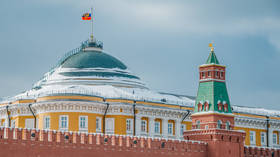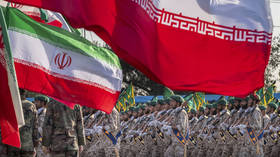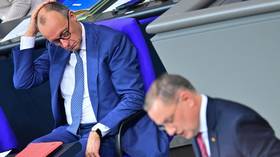Thousands rally in Germany as PEGIDA ‘anti-migrant’ movement marks 1 year since formation
The PEGIDA protest movement is celebrating its first anniversary by holding a number of rallies in Germany to be attended by thousands of people. The demonstrators are calling on the government to stop the influx of migrants and “Islamization” of Europe.
READ MORE: RT’s video agency cameraman attacked while filming PEGIDA rally in Dresden
Several German cities saw PEGIDA (Patriotic Europeans Against the Islamization of the Occident) protests on Monday, with the main event being held in Dresden, the movement’s “birthplace.” Over 20,000 protesters gathered at the rally in the capital of Saxony, according to Sächsische Zeitung.
“Money for our children instead of money for your asylum seekers!” and “Merkel has to go!” read the banners of the protesters.
"Money for our children instead of money for your asylum seekers". #Pegida. We hear what looks like a few fireworks pic.twitter.com/HXpkR54djG
— Thomas Sparrow (@Thomas_Sparrow) October 19, 2015First chant by the protesters: "Merkel muss weg" ("Merkel has to go") pic.twitter.com/Td5uor5As7
— Thomas Sparrow (@Thomas_Sparrow) October 19, 2015Along with Dresden, Hannover and Munich were set to host similar events, but on a smaller scale.
Counter-protests also found support in Germany. In Dresden, about 10,000 people came out for a rally organized by the anti-PEGIDA union “Nazi-free Dresden”.
“That’s enough! Heart instead of hate!” and “Falafel instead of sausage,” the posters of the anti-PEGIDA activists read.
The first PEGIDA rally in Dresden took place a year ago and was attended by about 350 participants. The number of supporters had increased to around 17,500 by the end of the year.
“[In the] First months, PEGIDA was a possibility to express fear and resistance against Islamization of Germany on the street,” Tatjana Festerling, one of PEGIDA’s leaders, told RT.
"We remain German". One of the many slogans in Dresden, in front of the opera house pic.twitter.com/vGrBfvW1ul
— Thomas Sparrow (@Thomas_Sparrow) October 19, 2015The movement’s popularity soared following terrorist attacks in France and about 25,000 people attended PEGIDA events on January 12. However, the movement started to wane after that. The movement’s public image was delivered a blow when photos of its leader, Lutz Bachmann, sporting a Hitler-like moustache and hair style emerged in the media, triggering his resignation.
LISTEN MORE:
The migration crisis that has erupted in Europe over the past few months has given fresh impetus to the PEGIDA movement, however.
In September, the movement issued a 10-point-program which included demands such as stopping the influx of asylum seekers, adopting a German asylum-emergency law, suspending the Schengen treaty, imposing stricter border controls and even exiting the EU if it tries to block the proposed program.
Plenty of police cars in Dresden get ready for Pegida one year anniversary and counter-protests. @dwnewspic.twitter.com/F5cLWd0E8Z
— Thomas Sparrow (@Thomas_Sparrow) October 19, 2015“Politicians and media – even representatives of churches – ignored these legitimate fears of the people and to date there is no public debate on the threat of salaphism and about the changes in our society,” Festerling said, pointing out the peaceful character of the movement.
“These discussions are suppressed in Germany – instead the anger of our establishment is aimed against its own citizens. Supposedly, in a democratic society it must be possible to lead an open discussion and an open discourse about the dangers of uncontrolled asylum flooding,” she added.
“We see already totalitarian patterns,” Festerling concluded.
Ohne Worte: Das Plakat bei der #Pegida-Demo. Ticker: http://t.co/caY8V5PCOt#DD1910pic.twitter.com/NeoXO2Mf2A
— sz-online.de (@szonline) October 19, 2015PEGIDA has been strongly criticized by the German authorities. German Minister of the Interior Thomas De Maizière called the organizers of the rallies “far-right extremists and demagogues.”“Stay away from those people who are injecting this hatred, this poison into our country!” he said.
German Minister of Justice Heiko Maas said that the PEGIDA-movement as well as, to some extent, the Eurosceptic party Alternative for Germany (AfD) are humiliating refugees and branding them as misfits. “That always begins with the words! At first it comes to psychological barrier and then real acts follow,” he said. The movement is usually criticized for racism, xenophobia and Islamophobia.
LISTEN MORE:












